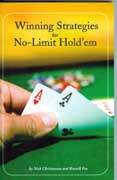
Winning Strategies for No-Limit Hold'em
Winning Strategies for No-Limit Hold'em Digs Deep
Russell Fox, co-author of two previously well-respected poker books, (Mastering No-Limit Hold‘em and Why You Lose at Poker) -- both with Scott Harker -- has now teamed with Nick Christenson for Winning Howard Schwartz, the "librarian for gamblers," is the marketing director for Gambler's Book Club in Las Vegas, a position he has held since 1979. Author of hundreds of articles on gambling, his weekly book reviews appear in numerous publications throughout the gaming industry. Howard's website is www.gamblersbook.com Strategies for No-Limit Hold‘em (200 pages, paperbound, $24.95), focusing on some advanced concepts few books have yet covered in depth.
Howard Schwartz, the "librarian for gamblers," is the marketing director for Gambler's Book Club in Las Vegas, a position he has held since 1979. Author of hundreds of articles on gambling, his weekly book reviews appear in numerous publications throughout the gaming industry. Howard's website is www.gamblersbook.com Strategies for No-Limit Hold‘em (200 pages, paperbound, $24.95), focusing on some advanced concepts few books have yet covered in depth.
Also, Roy Cooke and John Bond present How to Think Like a Poker Pro (281 pages, paperbound, $19.95), which is comprised of many of Cooke’s columns published from 2000 to 2005. The Cooke-Bond team also produced six other poker books including Real Poker and Cooke's Rules of Real Poker.
The Christenson/Fox book keys on the importance of planning ahead in no-limit hold’em, including when and why to switch between an optimal and exploitive strategy. It does this while teaching the player how to comprehend the difference between “deep-stacked and short-stacked play.” In addition, the book contains what the authors call “the most comprehensive examination of no-limit bet-sizing ever to appear in print.”
The book focuses on three major elements. The first part discusses the basics; playing styles and tactical notions. Part two offers an introduction to bet sizing and then moves to bet sizing on the river, on the turn, on the flop and pre-flop. The final part examines general opponents; small ball tactics and putting it all together.
This is a book for beginning but also more advanced players and thinkers. There are ideas on deception; a look at how (when in doubt) to bet more not less and why; leverage vs. implied odds, and having the nuts in position when your opponent checks, along with having the nuts out of position. Along the way, the authors reference moves and strategies suggested by some of the best in the business including Brunson, Sklansky and Harrington. World class players like Gavin Smith, Bill Edler and Erick Lindgren all endorse the book.
This book must be read slowly, absorbed, synthesized and applied gradually to improve your game. “Our aim in this book has been to demonstrate the way winning poker players approach the game. We firmly believe that winning poker players make money by folding, especially where our opponents may not,” the authors emphasize in one summary section of the book. “Folding bad hands is part of a disciplined approach to the game of poker.”
Overall, a book with value—about knowing how to play intelligently and learning more about yourself, limitations, gear shifting and honing skills.
Cooke and Bond have written a lively book covering much territory. There are four major sections to their work, covering philosophy of life and the game; the edge concept; turning pro and strategy and tactics.
There are more than 80 mini-lessons or articles here; many are colorful, personal poker experiences, funny stuff, all from Cooke’s adventures, confessions, lessons learned the hard way. Big nights, bad beats, specific hands, mistakes to learn from. Many players will relate to his experiences, and many will gain from his advice on things to avoid, expensive lessons and the quality of decision-making.
Basically, what Cooke relates is what it takes to win—how he found the edge -- who he respects as players, authors, theorists and the joy of being a professional.
This is an easy read because no sections are long—but they add up, like a nutritious sandwich of ideas, sort of like a combination defensive driving course mixed in with being a smart, savvy city driver—avoiding pitfalls, sharpening skills, learning how to brake and taking advantage of the less disciplined to carve an intelligent niche at the table.
Cookie is an “idea stimulator” and every level player will gain from his knowledge and experience.
